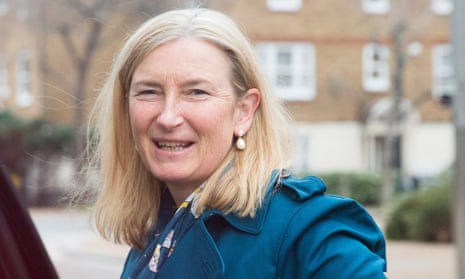NHS chiefs have been asked to immediately suspend handing over confidential patient data to the Home Office to track down potential immigration offenders as part of its “hostile environment measures”.
Dr Sarah Wollaston, the chair of the House of Commons health select committee, has written to NHS Digital calling for an immediate halt to the handing over of confidential details of more than 8,000 patients a year. The MPs say the situation is unacceptable and they have serious concerns about the way the NHS has approached its duty to respect and promote confidentiality.
A memorandum of understanding (MOU) between the Home Office and NHS Digital highlighted by the Guardian last year requires non-clinical details of patients, including their last known address, date of birth, details of their GP and date registered with a doctor, to be handed to immigration officials to help trace potential offenders.
At a heated session of the Commons health committee recently, MPs heard evidence from the charity Doctors of the World detailing their fears that the use of their data had led heavily pregnant women to delay seeing a GP for months. They also said they were aware of people choosing to wait until their situation was an emergency before attending A&E as they were not then required to give personal details.
Wollaston’s letter to NHS Digital says that in drawing up the MOU there has been “a failure to pay due regard to the underlying ethical considerations and potential unintended consequences for public health”.
She adds that the sharing of confidential patient data has gone ahead despite a warning from Public Health England that “it could present a serious risk to public health” that was “comprehensively ignored”. Wollaston says NHS Digital’s invocation of “the potential harm that might arise by not processing these tracing requests” – that is, that people will be left without help in the community for longer – is “wholly unconvincing”.
“The purpose of tracing these individuals is not to provide these individuals with medical assistance but to take enforcement action, presumably leading to deportation, and it seems to us to be misleading to include this point.”
Wollaston said she was calling for an immediate suspension: “We are seriously concerned about the way NHS Digital has approached its duty to respect and promote confidentiality. We call for a halt to the present system of information sharing and a full review of the original MOU with the Home Office. If this does not happen, we intend to hold further public evidence sessions requiring the chief executive to provide a very much more convincing case for the continued operation of this MOU than has been presented so far,” she said.
“Whilst we recognise the public interest in assisting on a case by case basis where a serious crime is being investigated, we do not agree with NHS Digital’s assertion that their current arrangements for the purpose of immigration tracing requests constitute case by case data sharing. There has been a failure to appreciate the wider implications of their actions for the individuals concerned, for clinicians, and for wider public health. Their actions not only undermine public confidence in confidentiality but put at risk the efforts to build support for data sharing in other vital areas such as medical research.”
An NHS Digital spokesperson responded to the letter, saying: “We can confirm we have received a letter from the chair of the health select committee. We will consider it carefully and will respond fully in due course.”
Deborah Gold of the National Aids Trust, one of several charities and voluntary organisations that have voiced concerns about the impact on undocumented migrants, said: “NHS Digital is meant to be the trusted safe haven for patient information. Sadly it has proven to be nothing of the kind and has been far too eager to breach our confidentiality. Scaring people away from healthcare has grave consequences for the individual and, in cases involving infectious disease, can endanger public health.”
